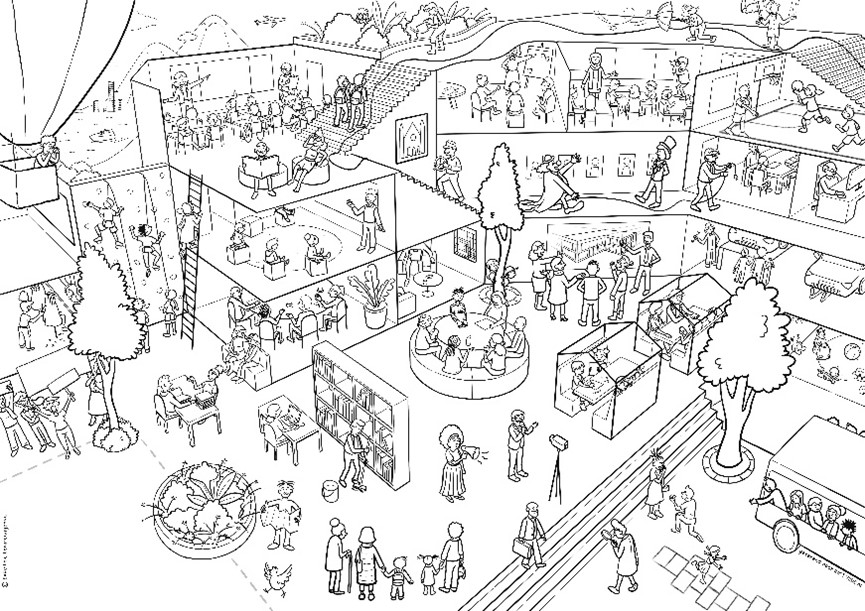Learning about inquiry

Secondary (11-19) and specialist teacher identity in England
August 24, 2017
Story-telling – a means and a method
November 23, 2017Learning about inquiry

Research, inquiry, researcherly dispositions (Tack & Vanderlinde (2016), a lot has been written on these topics in relation to teacher educators and to be honest, I do not care too much about getting involved in this discussion, I rather start acting. Of course, in my actions I am encouraged by literature, but for me it is the activity that counts. Hence, when I read articles about learning about inquiry through self-study (Lunenberg, Zwart & Korthagen, 2010; Lunenberg & Samaras, 2011), this inspired me very much. Fortunately, in 2016, I got the opportunity to initiate a self-study group for my colleagues.
Getting this opportunity was one thing, making it work in the hectic every-day life of teacher educators was another. Therefore, I decided to set some ground rules.

Ground rules self-study group
First, to fit self-study into the work tasks of my colleagues, the topic should contribute to their daily practice. This lead to the decision to focus on the task of every teacher educator to be a role model and a ‘teacher of teachers’ (Lunenberg, Korthagen & Dengerink, 2014).
Second, in order to be able for my colleagues to perform a self-study, it would be important to keep the study small with regard to data-gathering. For example: “for a small-scale study about my mentoring skills, I will videotape and analyse two mentor conversations with student teachers”.
Third, I am convinced that research activities improve by giving feedback to and receiving from others. Therefore, I wanted to encourage peer-feedback and peer-conversations within the group of participating teacher educators. To organise the process of giving feedback, I would use protocols. These protocols help to structure the feedback process and ensure that all participants have an active role. And because they all study some aspect of the same topic (ground rule 1), this would also help to get to a deeper layer of feedback.
Fourth, because teacher educators already have a busy job, the number of meetings should be limited and each meeting should contribute to the process of inquiry.
Fifth, sharing the outcomes of both the process and the findings are important. Therefore, a presentation to colleagues would be part of the trajectory, as well as a written report on the self-study. This report should have a maximum length of 4 A4 pages.
Design of the trajectory
Following these steps, I designed the trajectory for the self-study group. I organised six meetings of three hours, situated in a time period of six months (end of September - end of March).
- Kick-off meeting: introduction to the concept of self-study and to the topic ‘teacher of teachers’
- Making an outline for ones’ own self study
- Feedback on plans, start of the inquiry
- Feedback on data gathering and data analysis
- Trouble shooting, evaluation of own yields
- Presentation to colleagues and deliverance of small report
Starting the group
I composed an email to invite colleagues to participate in this group. In order to persuade them to participate, I used the word ‘professional development trajectory’ and I mentioned that this trajectory would consist of six meetings. I deliberately did not mention the word ‘research’, because that would set them off on the wrong track; most of my colleagues think research is something that is time consuming, difficult and not beneficial for them.
In 2016, eight people signed up (all female teacher educators). For these eight participants, the trajectory obviously was a success, because six of them will continue this trajectory with a new question. The other two had to stop; one is on a sabbatical leave and the other one cannot find time anymore.
Impressions after the trajectory
From the evaluation in the fifth meeting, we learnt that the participants saw two strands of professional growth. The first strand is development in their role as teacher educator, daring to take the step to dive into studying their own practice. The second strand is learning about inquiry.

Quotes of participants:
- ‘I see myself as an inquiring teacher educator’
- ‘Talking with group members about my inquiry contributed to my development’
- ‘This inquiry enhanced results for students and myself’
References
Lunenberg, M.L. & Samaras, A. (2011). Developing a Pedagogy for Teaching Self-Study Research: Lessons Learned Across the Atlantic. Teaching and Teacher Education, 27(5), 841-850.
Lunenberg, M.L., Korthagen, F. & Zwart, R.C. (2010). Critical issues in supporting self-study. Teaching and Teacher Education, 26(6), 1280-1289.
Lunenberg, M., Dengerink, J., & Korthagen, F. (2014). The Professional Teacher Educator. Roles, Behaviour, and Professional Development of Teacher Educators. Rotterdam/Boston/Taipei: Sense Publishers.
Tack, H., & Vanderlinde, R. (2016). Measuring Teacher Educators’ Researcherly Disposition: Item Development and Scale Construction. Vocations & Learning, 9(1), 43-62.
Veen, K. van, Zwart, R, Meirink, J., Verloop, N (2010). Professionele ontwikkeling van leraren. Een reviewstudie naar effectieve kenmerken van professionalisering van leraren. [Professional development of teachers. A review study on effective characteristics of the professionalization of teachers]. Review Study NWO-PROO. Leiden: ICLON/Expert Centre teacher learning.




